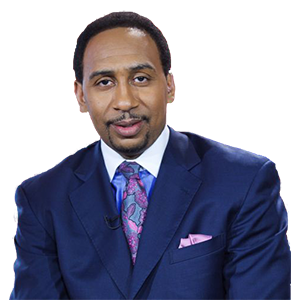
Stephen A. Smith
Biography
Stephen Anthony Smith was born on October 14, 1967 in the Bronx and raised in Queens. He worked as reporter for the Greensboro News and Record’s bureau in High Point before becoming a writer for the New York Daily News. In 1994, Smith left the Daily News for a staff writer position with the Philadelphia Inquirer, where he spent 16 years covering sports. Smith left the Inquirer in 2003 for ESPN, where he has worked ever since. His time at ESPN has included several radio stints, but is best known for his work on NBA Countdown and debate show First Take.
Interviewed by Abbigail Klein in 2019
I was more inclined to be a writer. They said I was good at it and I was going to do it, but I always aspired to be on television. It was definitely what I wanted to do, and I am the kind of person that when I set my mind to something, I usually think I am going to achieve it.
You keep your head up, even though that is very difficult. But also, it is a lot of introspection, it is a lot of looking in the mirror and recognizing the things that you did wrong. What a lot of people don’t realize is that the easier it is to point the finger at others, for the bad things that happen to you, the more difficult it is for you to overcome them because you are looking at everybody but yourself - there is no introspection to take place. As a result, you find yourself in a position where you are inclined to repeat some of the same mistakes you made along the way. It leaves you being just as unattractive as you may have been at the time those professional disappointment took place, it leaves you pointing fingers, it leaves you being more difficult to deal with, more difficult to accept and embrace. And it gives indications that you are not necessarily a team player because if we really think about it, particularly in the world of sports, how would we feel if we are covering someone that always pointed the finger at somebody else?
Even in the event that they are right most of the time, we would still find ourselves asking, "OK, so what are you going to do about it, how are you going to address you?" Because you can't control what others feel, what others do most of the time, you can’t legislate the actions of some people in certain situations, and almost all the time you certainly can't legislate what's in their heart. So what are you going to do about it? So if you aren't looking at yourself then how could you possibly help others when you have never helped yourself outside of pointing the finger in another direction?
I had a critical and persuasive writing class and a professor named John Gates. He was the editorial page editor for the Winston-Salem Journal in North Carolina and he was the professor of our class. He looked at me and he said, “You are a natural born sports writer.” When he saw my material because I was writing for the school newspaper just trying to earn extra credit semester hours and trying to build a career in journalism because I was majoring in mass communications and that was just the natural way to go. But I loved speaking far more than I love writing. It was him that convinced me that I could do this from a writing standpoint.
He took me out to lunch - he said he wanted to take me out to lunch the next week. It was on a Tuesday, and I said, “OK, fine.” And when I met him on campus for him to take me out to lunch, unbeknownst to me, he was driving me straight to the Winston-Salem newspaper and taking me directly to the office of the sports editor. That sports editor shook my hand, talked to me literally for five minutes and he said, “So when can you start?” And I said, “What?” He said, “I got a job for you here as a clerk, when can you start?” I said, “I can start right now.” He said, “See you at 7:00 tonight.” And that is when it all started.
First Take was once Cold Pizza, and it was Skip Bayless vs. a host of individuals. Once it became a debate format, and the name had changed to First Take, it was primarily Skip Bayless - actually all of Skip Bayless. He held it down and made things happen. In 2012, he approached me and said, “I know you’ve got other plans but I need you, I’ve taken this show as far as I can take it, and I can’t take it any further without you. Will you do this with me, please?” He was a friend, a person I’ve long had a lot of respect for. I knew that we had a natural on-air chemistry, perfect for a debate show. So I accepted his invitation and the show just took off from there.
My favorite sporting event, that I didn’t cover, was when I watched Mike Tyson and Evander Holyfield fight for the first time. My favorite event that I did cover, believe it or not, was a cross between three things. Michael Jordan’s crossover and jumper to win his sixth championship against Utah, Allen Iverson and the 76ers in Game 7 against the Milwaukee Bucks to advance to the NBA Finals in 2001, and last but not least, it was 1994 when Temple upset U-Mass., who was like No. 5 in the country, at McGonigle Hall, in Philadelphia. I was the Temple beat writer, I covered that event.

